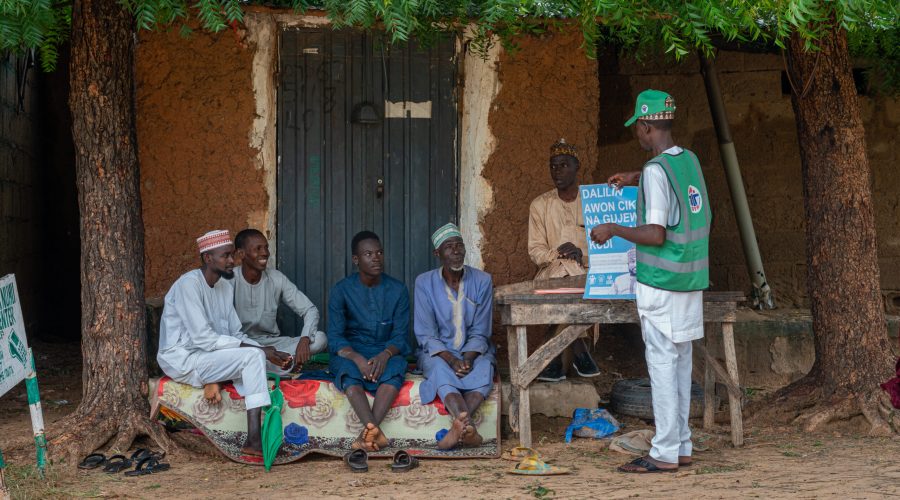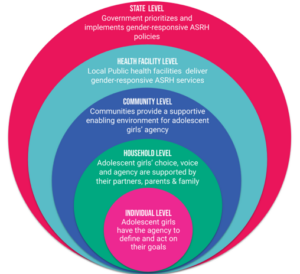By Tonka Noel, A360 Nigeria
Today, I am a 30-year-old Black man living in Nigeria. In all this time, I can only remember being in the sickbay during my undergraduate school days just once. This was when I was admitted in my third year because I had contracted cholera from contaminated water. Before this, I never went to the hospital—not for a personal check-up, to visit family, or to visit a friend— not once. I only knew that people went to the hospital if they were critically ill, for childbirth, or when the local pharmacists and chemists could not provide help. This is the story of many men my age and older.
In July 2024, I was privileged to travel over 3,000 miles to Kenya on a learning visit. Part of the itinerary during the learning experience was to observe a community-facilitated graduation ceremony for adolescent girls who successfully completed an economic strengthening adaptation component of the project. As this was the first of its kind to be held in the community, the place was noticeably filled with male religious leaders, husbands, male community heads, male parents, male members of different ministries and paramilitary outfits of government, and male principals—too many males.
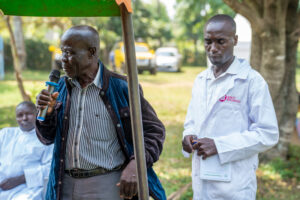
As the beautiful ceremony continued, an elderly man was called up to address the gathering. By observation, he was older than 65 years. After praising the economic adaptation components of the project and the impact it was achieving in the community for the girl child, the elderly man fell into a contemplative mood, as if his mind had traveled back to his youth. With sadness deep in his voice and tangible regret, he shared the following message: ‘The youth must be engaged. We must target the boy child as well. A lot of health issues will be resolved if we target the boy child.’
His words pierced my soul, and I have known no rest since my heart received them! I have been deeply troubled—not only by my own experience, which confirms the truth in his words, but also by the fact that this continues to be true even today.
A report by MenEngage Alliance reveals that traditionally, approaches to engaging men and boys in Sexual Reproductive Health Rights (SRHR) have focused on men and boys as partners or on certain behaviors that are viewed as typically male. Few have focused on men and boys as diverse individuals with their own SRHR needs and rights or as part of an uneven playing field.
We have neglected the boy child in health programming, just as he has been neglected in other areas of life. Negative societal norms that deprioritize interventions for the boy child are pervasive and, unfortunately, have become so ingrained that it is now almost an aberration for investors to even consider developing a program that targets the boy child.
Twenty years ago, I was a boy child. Social norms told me during the crises I witnessed, “In times of war, women are protected, men fight.” In teaching about gender attributes, my teachers told me, “Men are dirty, women are clean.” It was emphasized in biology class that girls needed to bathe more often and always be clean. At home, father figures, my uncles, and male peers told me, “Only women go to the hospital. A man—a real man—does not fall sick.” In church, emphasis was placed on prayer over seeking medical help, through the bastardization of the words, “And if anyone is sick, he should call the church elders, who will pray for him…” Back then, when social-development interventions came to the community, they said, “It is for the women; men stay back. The skills to learn were for the women and girls. Nothing should be of interest to the boy.” I feel deeply the anguish of regret in the old man’s voice. After all this time and all the investments that have been made in health and social programs, the needle has barely moved, and social norms remain largely unchanged.
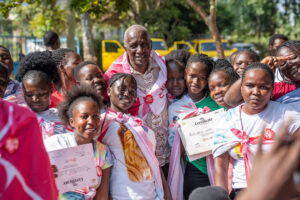
As I tell my own story—the story of the boy child and how he is neglected—I am reminded once again of my experience trying to influence an investment for the boy child. In 2021, I started to work more actively within the health and wellbeing program on a project that focused on breaking barriers to access to modern contraceptives for unmarried and married adolescent girls aged 15 to 19 in Nigeria.
During one of the first meetings I attended, the subject was possible areas for expansion and adaptation for the project. I asked the question, “What about investing in adolescent boys?” First, laughter filled the room, followed by the words, “For our investors, this is not a priority.” While that was not a problem, I wonder now how many times the same question has been asked over the years and how many times it has been answered with the words, “This is not a priority.”
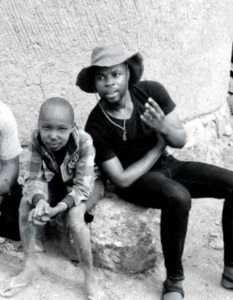
In the last paragraphs of this piece, I must tell of the laudable achievements that my current project has made. The adolescent girl/woman has been supported to develop her agency and self-efficacy to make informed choices about her life and continue on a contraceptive method to either space or delay pregnancy, thereby embracing greater opportunities for advancement.
Through the engagement with male religious leaders, husbands, male community heads, male parents, male members of different ministries and paramilitary outfits of government, and male principals—too many males—who are “key influencers” within her community and who continue to support her in making this choice, she is further empowered. The outcomes achieved in the economic adaptations research have shown that these impacts will be reduced without the enabling environment created by the men in society.
Today, I am thirty years old. I still do not fully understand why a woman needs to go to the hospital every so often. I still do not understand why there is such fuss over her health when no one fusses over me in the same way. I still cannot explain why she is targeted for economic and social interventions when the ground I am to plow as the “head of the house” is arid. I still do not understand all of this, but I am told to be fine and to support her and that I am not a priority. Very unfortunately, in the society where I live, the ability for these outcomes for the adolescent girl/woman to be successful still largely depends on my ability to understand what was never explained to me. I am a neglected man.
Drawing from my lived experience and the regret-filled words of the elderly man who lives over 3,000 miles from me, as well as the books I have read and the disposition of most investors, it is my conclusion that this is a social issue that burdens the health sector!
We must prioritize the boy child as well! A lot of health issues, even for women, will be successful if we also target the boy child.

